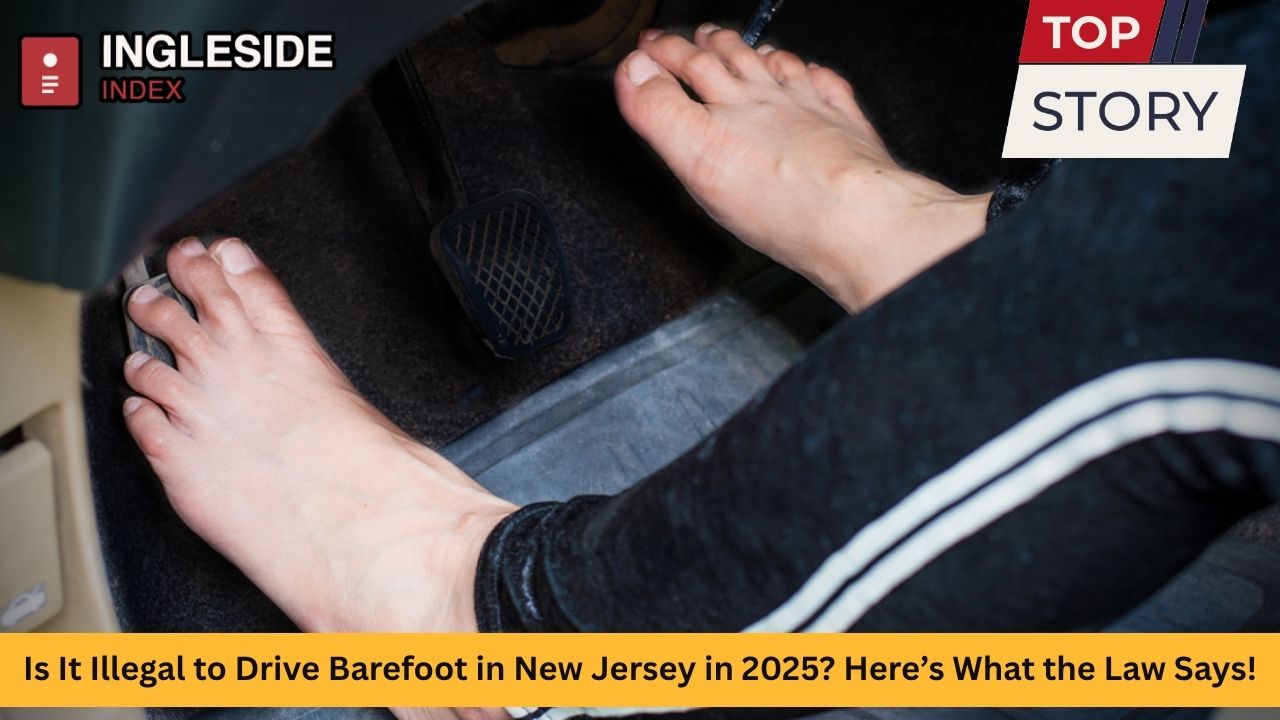Driving in the Garden State brings its own set of rules, traditions, and local quirks. Among the enduring urban legends, one stands out for both its frequency and the debates it inspires: Is it illegal to drive barefoot in New Jersey? From the busy streets of Newark and Jersey City to the serene drives down the Jersey Shore, this question intrigues new license holders and seasoned drivers alike. Let’s explore what the law actually says in 2025, bust longstanding myths, and examine both the safety and practical implications of shedding your shoes behind the wheel.
The Barefoot Driving Myth: Where Did It Begin?
The idea that driving barefoot is a punishable offense seems to be as ingrained in New Jersey folklore as pork roll sandwiches and the Turnpike. Despite many drivers insisting, “my driver’s ed teacher said it’s illegal,” the reality is very different.
Historically, the myth may have originated from broad safety campaign slogans, such as “No Shirt, No Shoes, No Service,” or from misunderstandings about traffic safety recommendations. Instructors and law enforcement officers might have warned about the dangers, but few ever referenced an actual statute. The truth is, for years, people have asked police officers at traffic stops in Atlantic City and paramedics in Morristown if ditching footwear was a ticketable offense.
What Does New Jersey Law Say in 2025?
If you dig into New Jersey’s state statutes and the Motor Vehicle Commission’s rules, you will not find any law, ordinance, or regulation that forbids barefoot driving for regular motorists. This means driving barefoot isn’t just an overlooked subject — it’s legally neutral. Driving without shoes, flip-flops, or any footwear is not specifically forbidden or even mentioned in New Jersey’s official driving laws.
This legal stance holds steady throughout 2025 for motorists operating passenger vehicles in all cities, from Hoboken to Cherry Hill and beyond. No county or local municipality has enacted a contradictory rule.
National Perspective: Is This Unique to New Jersey?
New Jersey is not alone — the same legal status exists in every state across the country. Over the past decade, several large-scale reviews have contacted Departments of Motor Vehicles nationwide, confirming that not a single state makes barefoot driving illegal. In the US, whether you cross the George Washington Bridge into New York City or drive west toward Easton, Pennsylvania, you’ll find similar rules.
Even large cities like Trenton, with its bustling commuter corridors, and beach towns such as Cape May and Ocean City, operate under the same statutes as the rest of New Jersey: no law against barefoot driving for passenger vehicles.
Can You Get a Ticket for Driving Barefoot?
While there’s no law explicitly banning barefoot driving, this does not make you immune from all legal consequences if you drive without shoes. If your driving is deemed unsafe — for example, if you cause an accident because your foot slipped off the pedal — law enforcement officers from Paterson to Princeton may still issue a citation or even charge you with reckless or careless driving.
In these cases, you aren’t ticketed for the act of driving barefoot itself, but rather for the unsafe driving behavior that resulted from it. This is a key distinction that many in New Jersey’s legal and insurance communities stress.
New Jersey Cities and Common Barefoot Driving Scenarios
Barefoot driving in New Jersey often arises in coastal areas and summer hot spots. Let’s look at some situations:
-
Long Branch and Asbury Park: Beachgoers flocking to the shore often leave flip-flops behind, hopping in the car barefoot after sunset strolls.
-
Seaside Heights and Point Pleasant: Locals frequently drive short distances barefoot after long beach days, with sand still clinging to their toes.
-
Downtown Newark and Elizabeth: Urban dwellers might slip off uncomfortable shoes during a long ride home after work or a night out.
-
Suburban towns like Westfield and Maplewood: Parents might find themselves barefoot behind the wheel during hectic mornings.
Throughout these diverse environments, the law remains consistent: no prohibition exists at the state or local level in 2025.
Are There Exceptions? What About Commercial Drivers and Motorcyclists?
While regular passenger car drivers are free to go shoeless, special rules apply to other vehicle categories:
-
Commercial drivers (such as those operating buses or trucks in Jersey City or Edison) may be subject to workplace policies from private employers requiring appropriate footwear.
-
Motorcycle operators and bicyclists have additional safety recommendations, though even here, New Jersey state law does not mandate footwear for motorcyclists.
Why Do So Many Believe Barefoot Driving Is Dangerous?
Despite being legal, many driving instructors and safety organizations, including those in metropolitan areas like Camden, urge caution when it comes to driving barefoot. Their reasons include:
-
Reduced Grip: Bare feet may have less grip on the pedals, potentially leading to slips during sudden maneuvers.
-
Increased Injury Risk: In the event of an accident, feet without shoes are more vulnerable to cuts, burns, and broken bones.
-
Muscle Fatigue: Long drives without supportive shoes could cause fatigue in the feet, possibly affecting reaction time.
-
Distractions: Some drivers may fidget more trying to find a comfortable position without shoes, posing a possible distraction.
Safety advocates argue these risks make barefoot driving less advisable, even if it remains legal.
Comparing Footwear: Barefoot Versus Flip-Flops, Sandals, and Heels
Not all footwear is created equal when it comes to driving safety. Studies and accident reports suggest:
-
Flip-flops and loose sandals: These are actually implicated in more pedal misapplications and are more often associated with traffic incidents than bare feet.
-
High heels and wedges: Common in urban centers like Hoboken, they can get stuck under pedals or make it harder to apply force quickly.
-
Heavy boots: Sometimes worn in rural and suburban North Jersey, boots can diminish tactile feedback and impede fast pedal movement.
-
Bare feet: While not ideal, they may allow better pedal feel than loose or chunky shoes, as long as feet aren’t wet or sandy.
Many safety experts in towns like Princeton and Summit recommend keeping a pair of sturdy sneakers in the car for optimal control.
Insurance and Accident Liability
While no law prohibits barefoot driving, insurance companies can consider your choice of footwear (or lack thereof) if you’re involved in an accident. If being barefoot is judged a contributing factor, your liability could increase—particularly if an adjuster determines it was negligent.
Imagine you’re in Montclair and rear-end another car while barefoot. If the investigation determines your foot slipped from the pedal, your insurance payout could be affected, or you might be found partially at fault.
The Cultural Side: New Jersey’s Beaches, Summers, and Car Freedom
Driving barefoot in New Jersey is often a matter of convenience and comfort. Along the Jersey Shore—whether at Avalon, Wildwood, or Belmar—shoeless drivers and passengers are hardly a rare sight. Summer temperatures in beach towns often exceed 85°F, and with the sand burning hot and flip-flops breaking left and right, many locals prefer to jump into their cars barefoot.
Even in North Jersey, after late-night events in places like Paramus or Bergenfield, tired commuters sometimes slip off shoes to relax. This culture of comfort, running from busy urban corridors to sandy beaches, reflects the state’s easygoing side.
Tips for Staying Safe: Going Barefoot the Right Way
If you opt to drive barefoot in New Jersey, consider these safety tips:
-
Make sure your feet are clean, dry, and free of slippery substances (like sunscreen or sand).
-
Store shoes under the seat rather than on the floor near the pedals, to prevent them from getting lodged.
-
Keep a pair of safe, comfortable shoes in your car, especially for long trips or inclement weather.
-
After swimming or walking at the beach in Stone Harbor or Sandy Hook, dry your feet before entering the driver’s seat.
The New Jersey Department of Transportation and several driving schools recommend such precautions, especially for new drivers in high-traffic areas.
Case Studies: Accidents and Legal Outcomes
Real-life accidents in New Jersey seldom cite barefoot driving as the primary cause. However, in rare cases investigated in places like Hackensack or Toms River, police or insurance agents might note that driving without shoes contributed to reduced control. This could be used to assess fault, especially if there’s evidence (dash cam, witness testimony) showing the foot slipped on the pedal.
Nevertheless, instances like these are extremely uncommon; the vast majority of New Jersey drivers face no issues at all from occasional barefoot motoring, provided their driving remains careful and controlled.
Barefoot Driving By the Numbers: National and Local Statistics
While hard-and-fast numbers on barefoot-related accidents are scarce, several national safety reports, including those from insurance and traffic safety organizations, provide insights:
-
More incidents occur due to drivers wearing flip-flops or sandals that become caught or slip off pedals versus true barefoot incidents.
-
Surveys in shore towns like Spring Lake and Lavallette report that over twenty percent of summer drivers admit to sometimes driving without shoes.
-
New Jersey’s crash statistics from recent years show no categorical increase attributable to barefoot drivers.
Frequently Asked Questions About Barefoot Driving in New Jersey
Can I drive barefoot on toll roads like the Garden State Parkway or New Jersey Turnpike?
Yes, the rules are the same on all public roads and highways in the state.
Will an officer in Edison or Clifton ticket me for being barefoot behind the wheel?
Not for being barefoot alone. However, any behavior—barefoot or otherwise—that causes unsafe driving could lead to other violations.
What about school bus drivers or delivery drivers in Summit or Morristown?
Commercial vehicle employers may have internal policies requiring shoes, but they are not mandated by state law for private trips.
International and Regional Comparisons
Interestingly, New Jersey’s stance mirrors much of the United States, but a few countries abroad do ban or discourage barefoot driving. For example, in Germany and parts of Australia, laws may advise motorists to wear shoes, and insurance companies may strictly limit liability in accidents involving barefoot drivers. New Jersey’s approach is considerably more lenient.
The Bottom Line: Comfort, Common Sense, and Caution
Barefoot driving is no crime in New Jersey in 2025, whether you’re rolling through the streets of New Brunswick, exploring the vineyards near Hammonton, or journeying along the Atlantic coast. The key message is to balance comfort with safety. Your freedom is not restricted by law, but you assume responsibility for the choices you make behind the wheel.
While shoes like flip-flops and stiletto heels pose greater hazards, and proper sneakers or driving moccasins are ideal for control, New Jersey motorists ultimately decide how to drive safely.
Final Thoughts
The barefoot driving myth will likely linger in New Jersey for years — fueled by beach days, family road trips, and those stubborn old rumors. But as of 2025, the answer is clear: Whether you’re navigating the traffic circles of Freehold or breezing along the Pine Barrens, you can drive barefoot without breaking the law.
Enjoy the ride, keep your feet (and your head) cool, and remember: Being shoe-free is legal, but being careful is essential wherever your Garden State adventures take you.




